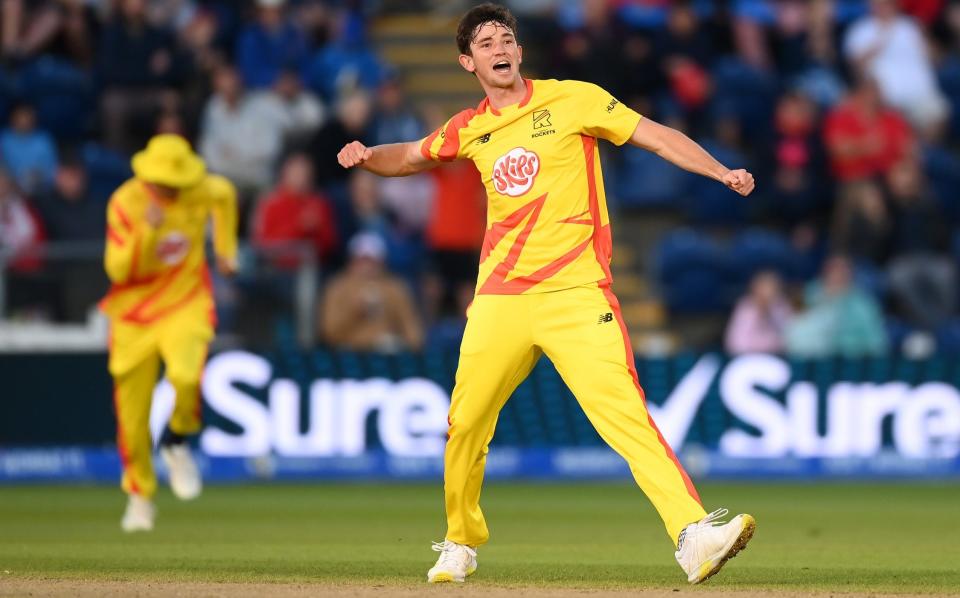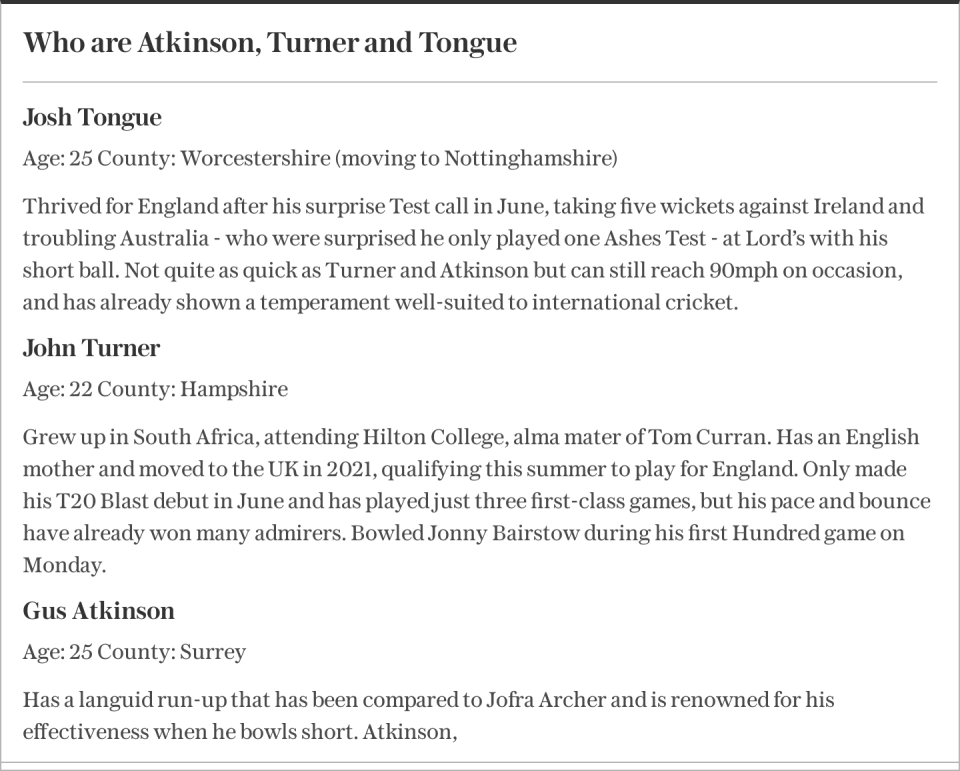
Jofra Archer’s likely absence at the World Cup deprives England not just of one of the quickest bowlers in cricket but one of the most skilful. And yet, for all he will be missed, in many ways England are better-placed to absorb Archer’s loss than anytime in his international career.
England’s squads – both for the ODIs ahead, including the World Cup, and the T20 series against New Zealand – reveal the country’s bourgeoning pace bowling depth.
The conditions, climate and domestic schedule in England all militate against producing quick bowlers. But along with Mark Wood, England’s squads include three other men who can reach 90mph: the uncapped Gus Atkinson, who is World Cup bound, John Turner and Josh Tongue, who will both only feature in the T20 series with New Zealand.
All were little heard of in English cricket until a couple of months ago. Tongue was surprisingly selected to make his Test debut against Ireland in June: he took a five-fer, and impressed in his one Ashes match too. Atkinson, who has only played two 50-over matches in his professional career, has made a stirring impression this year – reaching 95mph while bowling in the Hundred to Jos Buttler, and winning comparisons with Archer.
Turner’s rise is perhaps even more unlikely: he has played just three first-class games and only made his T20 Blast debut in June, but England’s scouts immediately noted his pace and bounce. Little more than a month after qualifying for England, Turner is now in an international squad.
Yet for all the differences in the stories of Atkinson, Tongue and Turner, the similarities are more striking. They have not earned their England selections through years of county toil. Instead, they have been picked more on their raw attributes than on domestic records. Based on their ages – 25 in the first two cases, and 22 in Turner’s – England could easily have left them to become more rounded bowlers in the domestic game. Instead, management have reasoned the players and national side are best served by them being picked now.

A player’s record in county cricket, as England have long known, says little about how they will perform in the international game: a reflection of the differences in pitches, conditions and the style of cricket opponents play. Such thinking was vindicated by the fine performances of Zak Crawley and Tongue – who would not have been picked over alternatives based on County Championship records – in the Ashes.
In the seaming conditions that dominate in the county game, wrist spin and pace are often altogether riskier than nipping the ball at 80mph on a good length. Yet, wrist spin and pace are essential to thrive in international cricket – particularly on the flatter pitches that dominate the white-ball game. Adil Rashid has been at the heart of England’s transformation after 2015; giving Rehan Ahmed his international debut in all three formats aged 18 is a way of accelerating the development of his eventual successor.
Similar thinking is also being applied to England’s pace bowling stocks. Bowlers who can reach 90mph in English cricket are rare. And so England’s approach is to identify men with pace and short-circuit the normal talent pathway. Atkinson and Turner will make their England debuts without ever having played for the Lions. Turner only made his Hundred debut the night before England’s selection meeting.
These selections reflect England’s determination to ensure they assemble an attack that includes the pace to threaten in all climes. In one-day cricket, especially since changes to fielding restrictions in 2015, taking wickets through the middle of an innings is the best way to contain.
“It’s something we’re really excited about, to see the amount of pace that is going around,” said England’s selector Luke Wright. “We want to have that depth but give them that exposure.”
While Atkinson’s selection is for the World Cup, Turner and Tongue have been picked with future challenges in mind. The demands of county cricket – this summer began with seven Championship rounds in eight weeks – prevent bowlers from being able to bowl at full pelt.
Having the few 90mph men that England possess in the national set-up – particularly if they are given some form of contracts – will maximise the selectors’ control over them and how they can shape their development, especially given the competing attraction of franchise leagues.
Wood is 33; Archer is 28, and has endured a torrid run of injuries. If England are to continue to field the pace that a varied attack needs, in all three formats, they will need Atkinson, Turner and Tongue to continue their startling rate of ascent.
All going well, the trio could be at the heart of England’s plans not just in white-ball cricket, but on the 2025/26 Ashes tour.
Article courtesy of
Source link